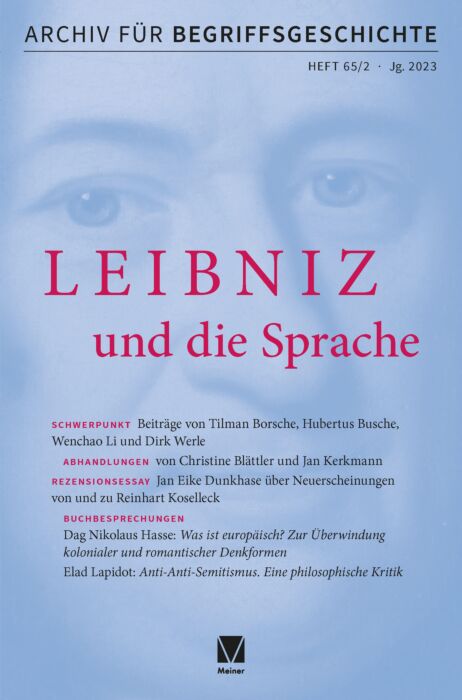Archiv für Begriffsgeschichte. Band 65,2
Schwerpunkt: Leibniz und die Sprache

In Verbindung mit Hubertus Busche und Michael Erler herausgegeben von Carsten Dutt
Reihe:
Archiv für Begriffsgeschichte
65,2
Wird geladen …
Ab:
44,90 €
Ab:
ca.
Beschreibung
Bibliographische Angaben
| Einband | |
|---|---|
| DOI | |
| Auflage | |
| ISBN | |
| Sprache | |
| Originaltitel | |
| Umfang | 183 Seiten |
| Erscheinungsjahr (Copyright) | 2024 |
| Reihe | Archiv für Begriffsgeschichte |
| Herausgeber/in | Carsten Dutt Hubertus Busche Michael Erler |
| Beiträge von | Christine Blättler Tilman Borsche Hubertus Busche Jan Eike Dunkhase Carsten Dutt Jan Kerkmann Wenchao Li Dirk Werle |
| Hersteller nach GPSR |
Felix Meiner Verlag GmbH |
Service
Einzelartikel als PDF
The following contribution aims to present and evaluate the complex network of topics and ideas pertaining to language across the breadth of Leibniz’s writings. The first part provides a structured overview of Leibniz’s historical language studies, which played a pioneering role in evidence-based scientific investigations across various fields, such as the history of languages, the origin(s) of language(s), language change, and grammatical theory. It also explores Leibniz’s positions on language politics. The second part of the paper investigates the partially covered role that questions of language play in constructing Leibniz’s philosophical system, illuminating how much his philosophical achievements draw inspirations both from his juridical experiences and his mathematical inventions. The paper concludes with new insights into Leibniz’s conception of scientific truths, analyzing how we operate with words as signs of distinct primitive notions or ideas.
16,90 €
Eine Einführung in seine Philosophie anhand seiner Neologismen
Leibniz significantly enriched our philosophical language with around a hundred neologisms. This paper commences with an exemplary overview of the encyclopaedic breadth of Leibniz’s neologisms. In its main part, it provides an introduction into Leibniz’s still unfamiliar intellectual world by elucidating the underlying concepts of eight of his most innovative linguistic coinages. These neologisms, either misunderstood in a notably high degree or inherently obscure, are explored in detail.
16,90 €
Leibniz’ Gedicht auf den Tod der Königin Sophie Charlotte (1705)
This paper analyzes and interprets Gottfried Wilhelm Leibniz’s 1705 poem on the death of Queen Sophie Charlotte. The poem is examined within its historical context, and existing research literature is critically evaluated. With a dual objective, the paper firstly seeks to enrich the predominantly philosophical focus of existing research by introducing a nuanced perspective from literary studies. Secondly, it aims to consolidate the current state of research within this specific intersection of literature and philosophy.
16,90 €
Leibniz’ Projekt einer characteristica universalis
Throughout his entire life Leibniz pursued the project of a universal language. His vision involved reducing all complex concepts to simple ones, creating a »catalogue of elementary thoughts.« By associating specific signs, whether in the form of alphabetic characters or numbers, with the analyzed concepts, he aimed to facilitate the accurate synthesis of all ideas. Leibniz envisioned that conflicts could be resolved with a mere stroke of the pen, as thinking, in his perspective, was synonymous with calculating. In essence, he urged: »calculemus« – let us calculate!
16,90 €
Die Begriffsgeschichte des Göttlichen in Hölderlins Spätwerk
The essay endeavours to illustrate Hölderlin’s reconciliation of myth and reason through his Notes on the Antigone (Anmerkungen zur Antigonä). The central thesis posits that Hölderlin employs a conceptual-historical method to contemplate the varied epochal manifestations of the divine. This thesis is reinforced through an analysis of Hölderlin’s conception of ›Zeus.‹ In the Notes, ›Zeus‹ symbolizes the divine or the infinite, embodying the protector of human finitude against the forces of hostile nature. Hölderlin chooses vivid, innovative terms to articulate the divine as it traverses different epochs and worlds of life. Consequently, it is argued that Hölderlin’s creation of novel terms reflects a hermeneutic response to ongoing transitions rather than arbitrary choices. Ultimately, Hölderlin maintains the precedence of history over stable concepts, with conceptual transformations mirroring those of actual historical processes.
16,90 €
The prominent position of Martin Heidegger’s phenomenology of care in Being and Time continues to make it the primary reference for a philosophical concept of care that extends beyond the boundaries of the discipline. Heidegger presents care as a structural whole that establishes the relationship between human being and the world, treating it in an existential-ontological manner. This approach and its implementation provoked Hans Blumenberg’s theoretical opposition. The article explores Blumenberg’s engagement with Heidegger’s concept of care in both its explicit and implicit ways, thereby illustrating how Blumenberg developed a phenomenological alternative to the relation between care and the world. To achieve this, the article examines how the relation in question is established in the works of both philosophers. It also discusses the underlying presuppositions in each case, the associated implications, and the philosophical consequences. The contribution is divided into the following chapters: 1. Beyond the Fable of Hyginus; 2. Reality: evidence vs. historical reference; 3. World: soil vs. sky; 4. Cura vs. Prometheus; 5. Holism vs. distance; 6. Cultural pessimism vs. philosophy of culture.
16,90 €
6,90 €
